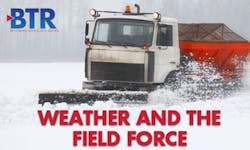Field Forces and Bad Weather
It's a hard time for lots of folks. This includes cable field forces, who must deal with the inconveniences of the weather - along with the fact that, if anything, people stuck inside their homes for long periods will be particularly sensitive about anything that impacts any of their broadband services.
There is, of course, one totally obvious suggestion for field forces operating in bad weather: Drive slower and even more carefully than usual. There are, however, more subtle steps an operator, the field techs, and even subscribers can take to make the best of a wet and cold situation.
The first step is to prepare. If an operator waits until the first snowflakes, it is in trouble. "A preparedness plan should be communicated to the techs as to how it will operate during those times is the most important thing," said Doug Simmons, the senior vice president of sales and marketing for PenguinData.
The focal point of how an operator reacts to adverse weather conditions - and the agent that puts many of the policies and procedures upon which the operator has settled in place - is the dispatch system. It must be flexible enough to automatically handle the changes that stormy weather makes necessary, said Gary Dennis, a product manager for Trimble. Some, indeed, are flexible enough to operate in bad weather mode in a section of a system with a large footprint and in normal mode elsewhere.
Such a system should automatically do what a dispatcher would need to do anyway. "For example, systems have a dispatch equation that sets time, distances, speeds that are set for a normal day," Dennis said. "But if there is a snow storm in upstate New York and the techs can't drive as fast, the system would implement a new model for the day automatically. The snow day mode would change all the equations and redo workload."
Doing that recalculation on the fly and manually would mean chaos. In a bad weather scenario, it is a virtual certainty that some jobs will be dropped. An important feature of the dispatch system, however, would be to make it easy for the operator to do so selectively. In most cases, repairs - keeping current customers happy - would be prioritized over installs.
Dennis also points to the need to redouble efforts to protect the technicians. On a normal day, a field tech goes about his business with little tracking. On a bad day - particularly if the problem involves tornadoes - it is important to closely track field techs and warn them if they are in a dangerous area. Tracking techs' phones instead of the vehicles is recommended. In some situations, doubling up technicians - even at the expense of reducing the number of jobs accomplished - may be prudent.
In addition to protecting the techs, knowing where they are enables improvising: Suppose, for instance, phone service went down at a hospital or in the home of a critically ill person. If a technician happens to be in the area, it would be possible to have him take care of that problem, even if it means canceling a less urgent call.
Finally, the response to bad weather must include heightened communications with subscribers. Obviously, if an appointment is going to be delayed or cancelled because of a storm, the operator must take advantage of all the new telecommunications options to get that news to the subscriber. In addition to operator outreach, the subscriber should be able to proactively learn the status of the job at an online portal.
But it is a two-way street: It behooves the operator to know the status of the subscriber. The current weather patterns impact huge areas, and it is not uncommon to seek shelter with a friend or relatives or to be stuck out of town. Those folks should be encouraged to contact the operator. Likewise, the MSO's outbound calling system should be capable of automatically calling to verify that the customer indeed will be at home.
The point is that a truck roll through a blizzard to an empty home is especially counterproductive and potentially dangerous. "You don't want to send a tech in the rain, sleet and snow to find out somebody is not there because they are in Omaha and their plane is late," said Jeff Wartgow, the vice president of product marketing for TOA Technologies. "An operator should establish that the person is not there and let the tech serve others. For that situation, safety is not an issue because the technician does not have to make the trip."
The bottom line is that much of the country is suffering through the type of weather that has not been seen for decades. Not paying attention to it can have a big cost. "Clearly, nobody can predict the weather," Wartgow said. "But we can manage how field forces operate and how it is impacting customers when it gets bad."
Carl Weinschenk is the Senior Editor of Broadband Technology Report. Contact him at [email protected].
